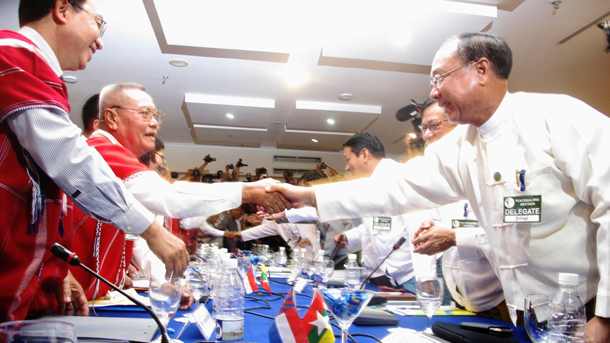RANGOON — A budget request of 7 billion kyats (US$7.1 million) for Burma’s peace process and national reconciliation efforts has been submitted to Parliament as a designated appropriations item for the first time.
Kan Chun, a President’s Office official, told a session of Parliament this week that President Thein Sein intended the funds, which fall under the broader “national planning” budget, to be used for the ongoing peace process between the government and more than a dozen ethnic armed rebel groups.
The request marks the first time that a “peace appropriation” has been requested as a component of the state budget. Last year, one million kyats—diverted from its originally earmarked purpose of funding the construction of housing for parliamentarians in Naypyidaw—was the extent of government funding for peace talks. Outside funders such as the Norway Peace Initiative and Japan’s Nippon Foundation have been the main financial backers of the peace process in Burma. Foreign governments and the European Union have also been major supporters.
“The budget was not proposed by MPC,” said Hla Maung Shwe, a leading member of the Myanmar Peace Center (MPC) who added that he felt the funding request was excessive.
“The proposed peace budget this year is so much, in my opinion. Seven times more than the previous amount,” he said.
Still, the funding request is just a fraction of the 2.36 trillion kyats that Burma’s Defense Ministry proposed this week for its 2014-15 budget.
Funds designated for Burma’s peace process go to a variety of different initiatives and expenditures, including the set-up and staffing of liaison offices in ethnic regions, development programs and coordinating operations run by the MPC, a government-affiliated entity formed with 700,000 euros ($950,000) in start-up funding from the European Union. In announcing the formation of the MPC in November 2012, the European Union pledged an additional 30 million euros in support for the peace process in 2013.
“The budget, if approved by the Parliament, will be used by the concerned persons in the peace process within the framework of the Central Peace-making Committee and Working Committee,” Hla Maung Shwe said on Thursday, referring to the government’s two main peace negotiating bodies.
Funding for Burma’s peace process has come in for criticism in the past by observers who have urged greater transparency. Total funding the peace process since Thein Sein embarked on an ambitious effort to reconcile with the country’s many ethnic groups in 2011 is difficult to estimate. The Myanmar Peace Monitor, a project that tracks the peace process in Burma, said some $500 million was committed to various peace initiatives by mid 2012.
This week an official from the Norway-funded Myanmar Peace Support Initiative (MPSI) said the program was being reviewed to determine whether it remained relevant two years after its launch, during which time the MPSI put $2 million toward dozens of peace initiatives in Burma.
Hla Maung Shwe said the government aims to establish a framework for political dialogue this year, an aspect of the national reconciliation process that ethnic groups have long called for.
Since Thein Sein took office, the government has signed ceasefires with 14 of the country’s 16 main armed rebel groups. It hopes to reach a “nationwide ceasefire” with all of the groups in the coming months.

















